-
Published2 hours ago
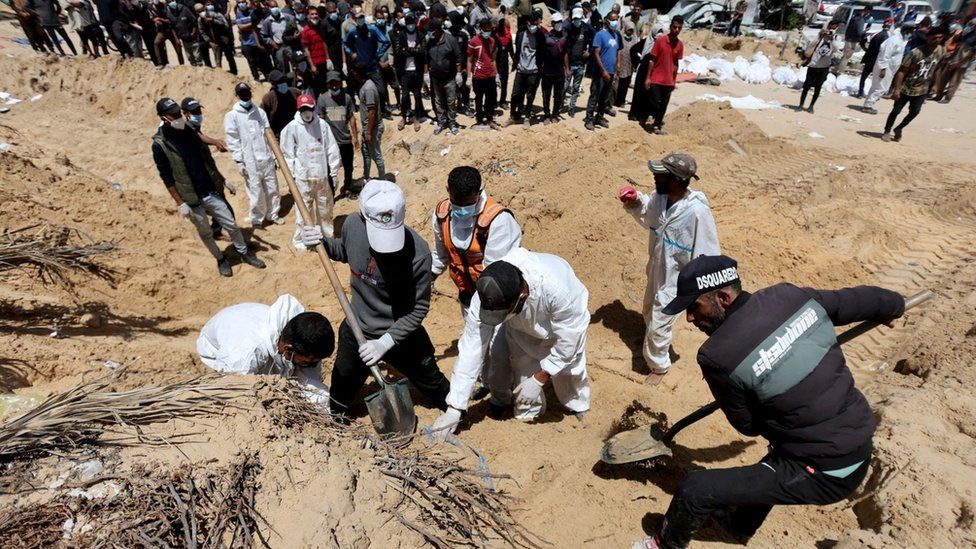 Image source, Reuters
Image source, ReutersThe UN’s human rights chief has said he is “horrified” by the destruction of Gaza’s Nasser and al-Shifa hospitals and the reports of “mass graves” being found at the sites after Israeli raids.
Volker Türk called for independent investigations into the deaths.
Palestinian officials said they had exhumed the bodies of almost 300 people at Nasser. It is not clear how they died or when they were buried.
Israel’s military said claims that it buried bodies there were “baseless”.
But it did say that during a two-week operation at the hospital in the city of Khan Younis in February, troops “examined” bodies buried by Palestinians “in places where intelligence indicated the possible presence of hostages”.
Ten hostages who have now been released have said that they were held at Nasser hospital for long periods during their captivity.
Prior to the Israeli operation at Nasser, staff there had said they were being forced to bury bodies in the hospital’s courtyard because nearby fighting prevented access to cemeteries. There were similar reports from al-Shifa before the first Israeli raid on the hospital took place in November.
The Israeli military has said it has raided a number of hospitals in Gaza during the war because Hamas fighters have been operating inside them – a claim Hamas and medical officials have denied.
The war began when Hamas gunmen carried out an unprecedented cross-border attack on southern Israel on 7 October, killing about 1,200 people – mostly civilians – and taking 253 others back to Gaza as hostages.
More than 34,180 people – most of them children and women – have been killed in Gaza since then, the territory’s Hamas-run health ministry says.
A spokeswoman for the UN Human Rights Office said it was currently working on corroborating reports from Palestinian officials that 283 bodies had been found in Nasser hospital’s grounds, including 42 which had been identified.
“Victims had reportedly been buried deep in the ground and covered with waste,” Ravina Shamdasani told reporters in Geneva.
“Among the deceased were allegedly older people, women and wounded, while others… were found with their hands tied and stripped of their clothes.”
Mr Türk called for independent, effective and transparent investigations into the deaths, adding: “Given the prevailing climate of impunity, this should include international investigators.”
“Hospitals are entitled to very special protection under international humanitarian law. And the intentional killing of civilians, detainees, and others who are hors de combat [not participating in hostilities] is a war crime.”
On Monday, a spokesman for the Hamas-run Civil Defense force told BBC Arabic’s Gaza Today programme that it had received reports from local Palestinians that the bodies of a “large number” of people who had been killed during the war and buried in a makeshift cemetery in the hospital’s courtyard were moved to another location during the Israeli raid.
“After research and investigation, we learned that the occupation [Israeli] army had established a mass grave, pulled out the bodies that were in Nasser hospital, and buried them in this mass grave,” Mahmoud Basal said.
Gaza Today also spoke to a man who said he was searching there for the bodies of two male relatives which he alleged had been taken by Israeli troops during Israel’s recently concluded offensive in Khan Younis.
“After I had buried them in an apartment, the [Israelis] came and moved their bodies,” he said. “Every day we search for their bodies, but we fail to find them.”
Hamas has alleged that the bodies include people “executed in cold blood” by Israeli forces, without providing evidence.
This video can not be played
To play this video you need to enable JavaScript in your browser.
The Israel Defense Forces (IDF) said in a statement on Tuesday: “The claim that the IDF buried Palestinian bodies is baseless and unfounded.”
“During the IDF’s operation in the area of Nasser Hospital, in accordance to the effort to locate hostages and missing persons, corpses buried by Palestinians in the area of Nasser hospital were examined.
“The examination was conducted in a careful manner and exclusively in places where intelligence indicated the possible presence of hostages. The examination was carried out respectfully while maintaining the dignity of the deceased. Bodies examined, which did not belong to Israeli hostages, were returned to their place.”
The IDF said that its forces had detained “about 200 terrorists who were in the hospital” during the raid, and that they found ammunition as well as unused medicines intended for Israeli hostages.
It also insisted that the raid was carried out “in a targeted manner and without harming the hospital, the patients and the medical staff”.
However, three medical staff told the BBC last month that they were humiliated, beaten, doused with cold water, and forced to kneel for hours after being detained during the raid.
Medics who remained at Nasser after the Israeli takeover said they were unable to care for patients and that 13 died because of conditions there, including a lack of water, electricity and other supplies.
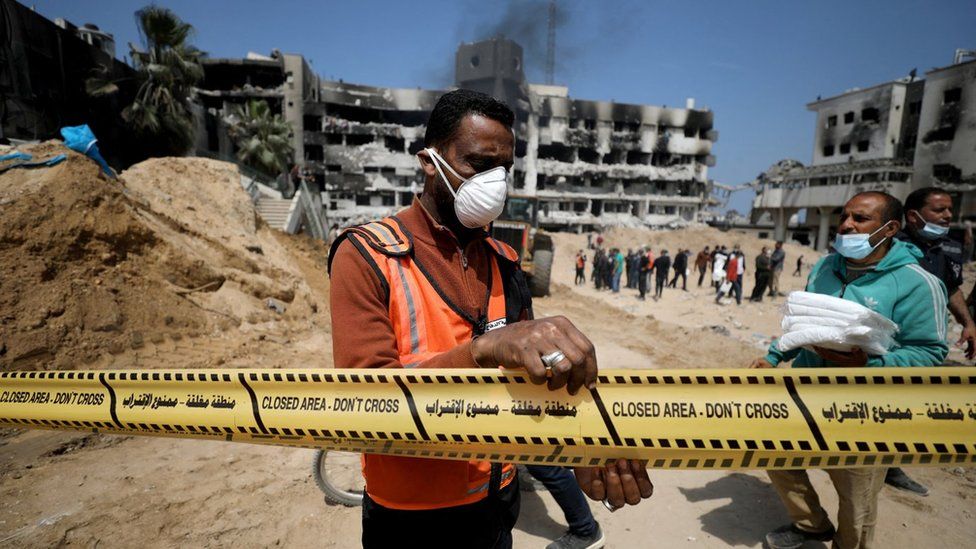
On 1 April, Israeli troops withdrew from al-Shifa hospital, which is in Gaza City, following what the IDF said was another “precise” operation carried out in response to intelligence that Hamas had regrouped there.
The IDF said at the time that 200 “terrorists” were killed in and around the hospital during the two-week raid. More than 500 others were detained, and weapons and intelligence were found “throughout the hospital”, it added.
After a mission gained access to the facility five days later, the World Health Organization (WHO) said al-Shifa was “now an empty shell”, with most of the buildings extensively damaged or destroyed, and the majority of equipment unusable or reduced to ashes.
It also said that “numerous shallow graves” had been dug just outside the emergency department, and the administrative and surgical buildings, and that “many dead bodies were partially buried with their limbs visible”.
The IDF also said it had avoided harm to patients at al-Shifa. But the WHO cited the acting hospital director as saying patients were held in abysmal conditions during the siege, and that at least 20 patients reportedly died due to a lack of access to care and limited movement authorised for medics.
Spokeswoman Ms Shamdasani said reports seen by the UN human rights office suggested that a total of 30 bodies were buried in the two graves and that 12 of them had been identified so far.
Gaza’s civil defence spokesman told CNN on 9 April that 381 bodies had been recovered from the vicinity of al-Shifa, but that the figure did not include people buried in the hospital’s grounds.
The UN human rights chief also deplored as “beyond warfare” a series of Israeli strikes on the southern city of Rafah in the past few days, which he said had killed mostly women and children.
The strikes included one on Saturday night, after which a premature baby was delivered from the womb of her pregnant mother, who was killed along with her husband and other daughter.
Mr Türk also again warned against a full-scale Israeli ground assault on Rafah, where 1.5 million displaced civilians are sheltering, saying it would lead to further breaches of international humanitarian law and human rights law.
In response, the IDF said it was “operating to dismantle Hamas military and administrative capabilities”.
“In stark contrast to Hamas’ intentional attacks on Israeli men, women and children, the IDF follows international law and takes feasible precautions to mitigate civilian harm,” it added.
-
-
Published1 day ago
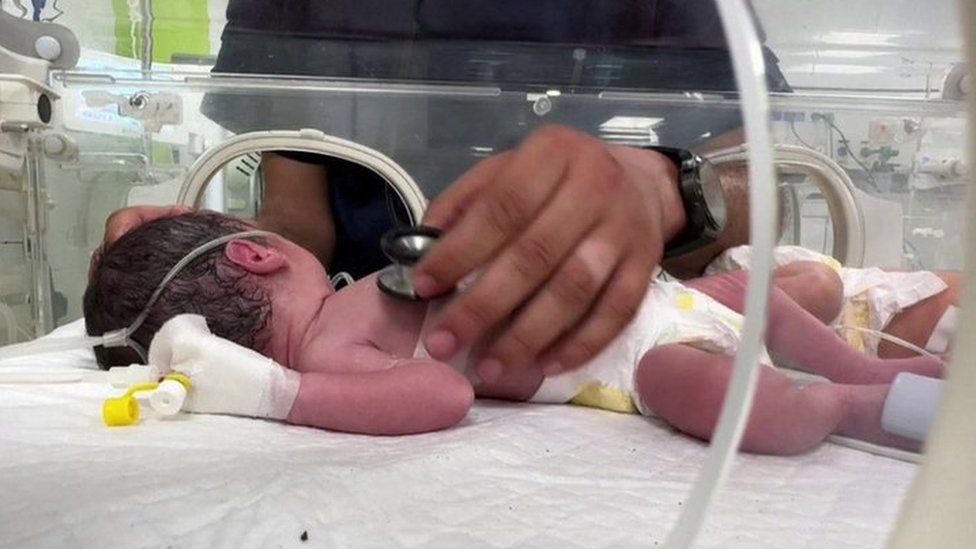
-
-
-
Published1 day ago
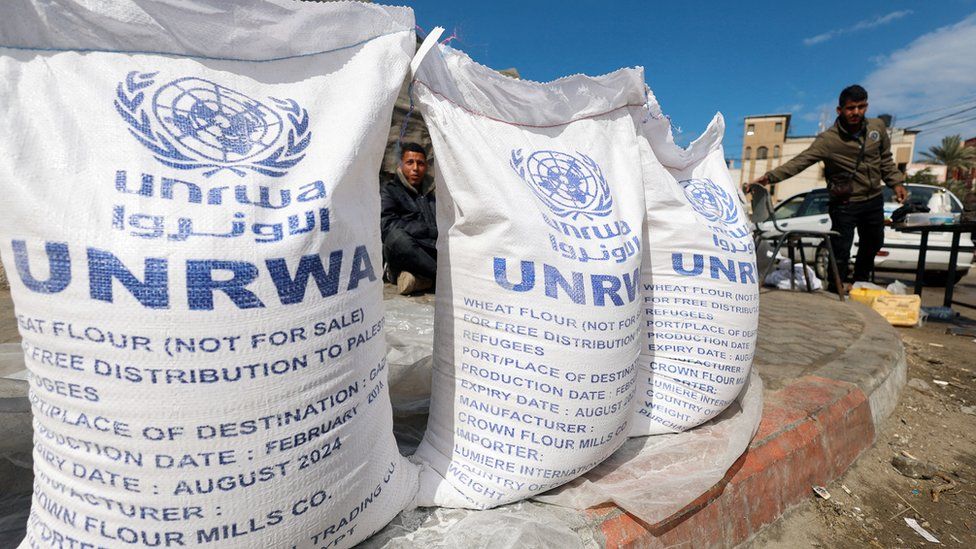
-
-
-
Published3 days ago
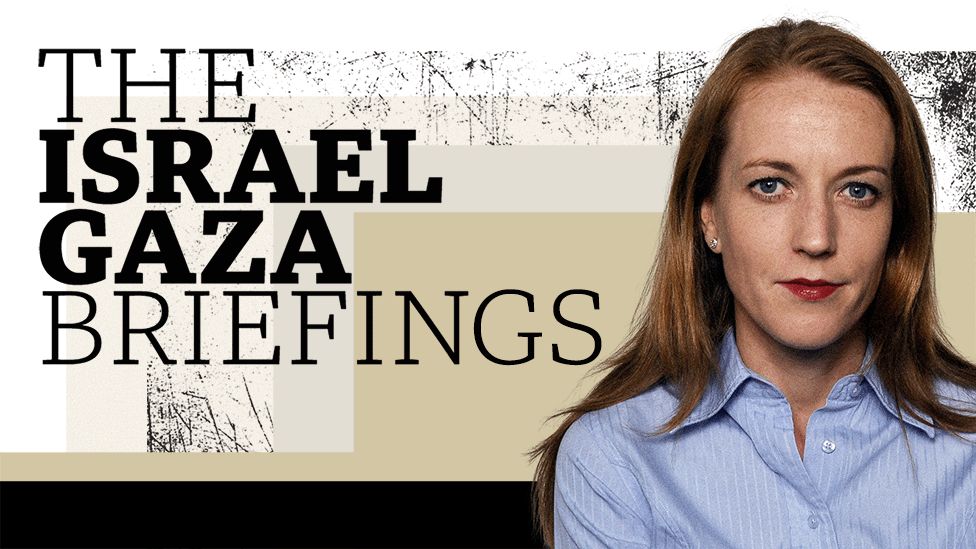
-
-
-
Published1 April
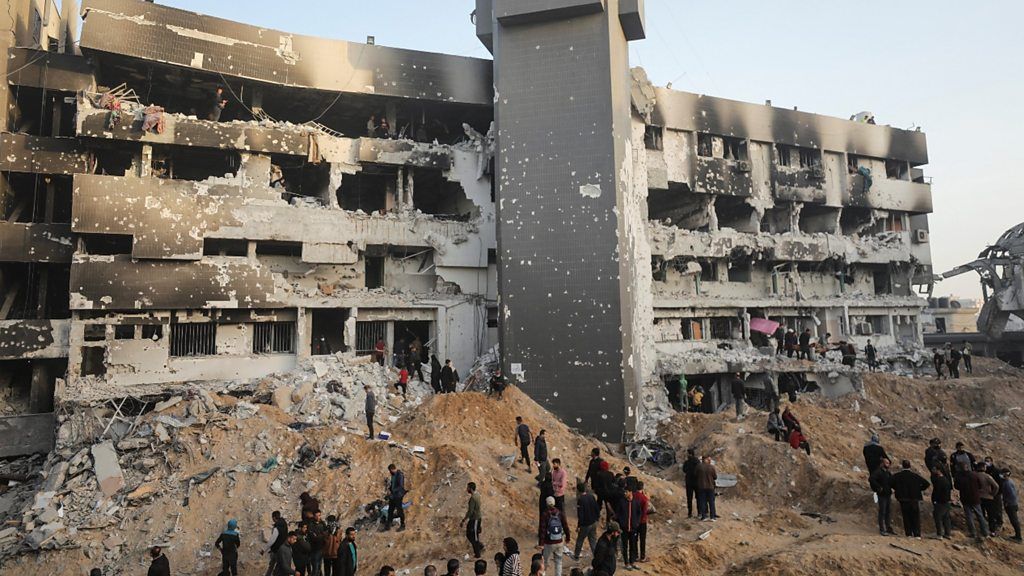
-
-
-
Published1 April
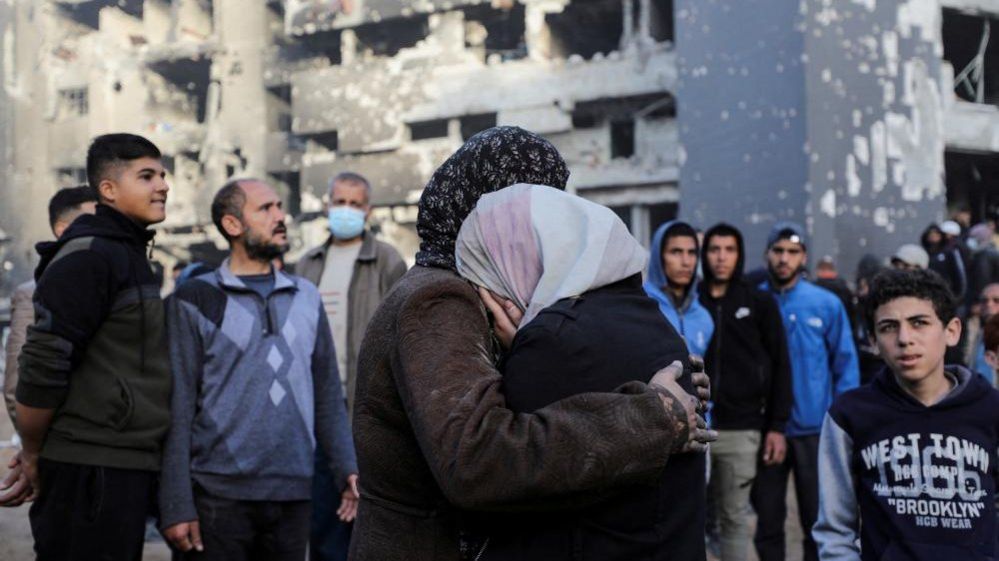
-
-
-
Published15 February
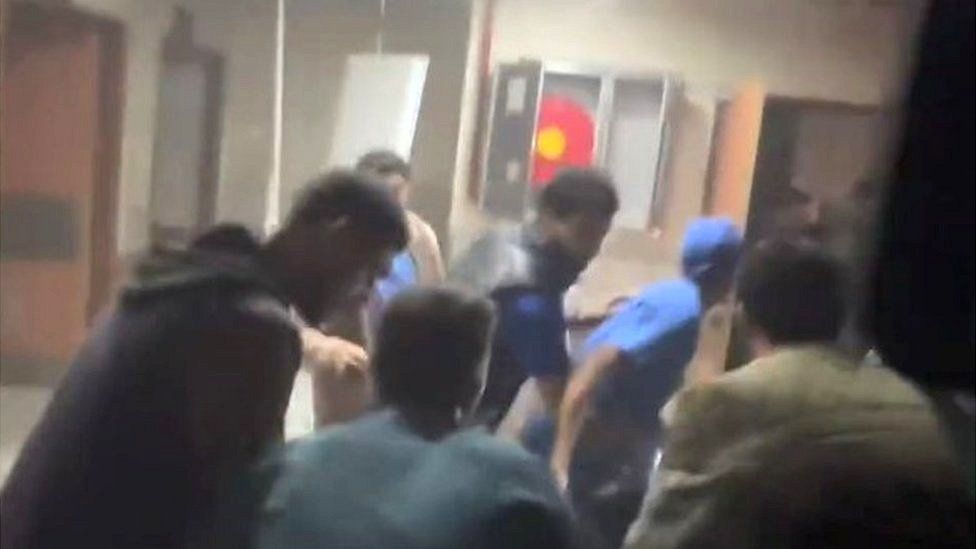
-

